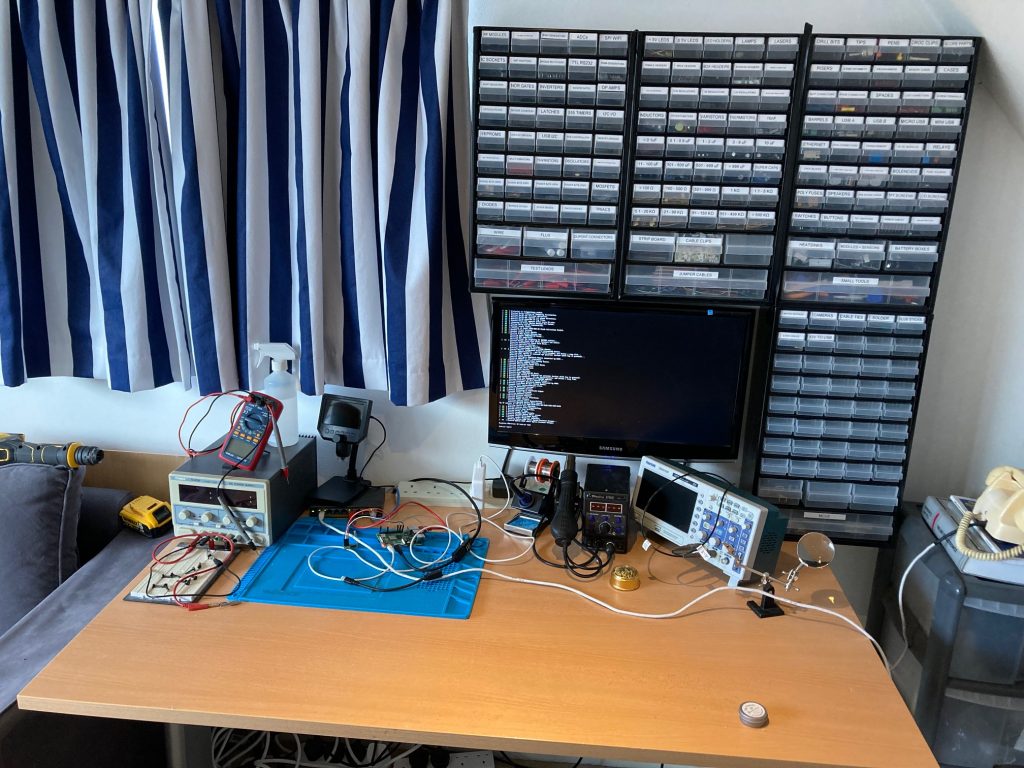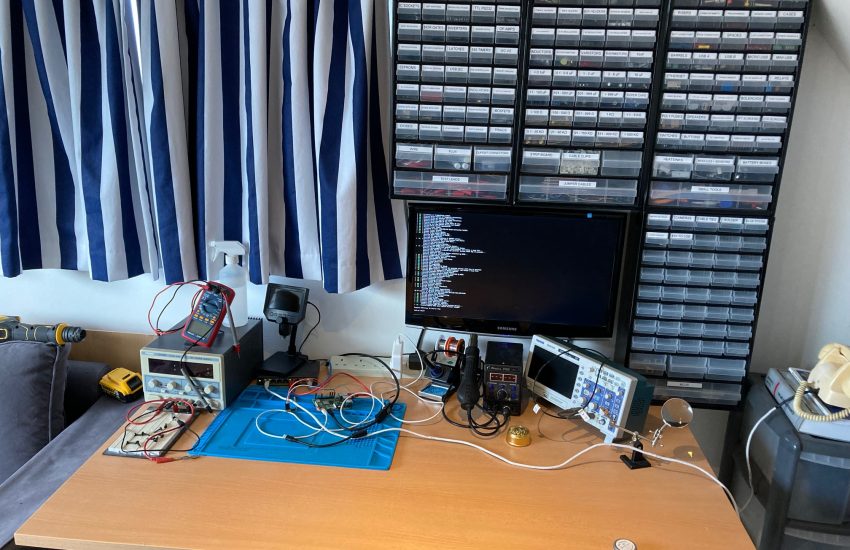I’ve recently gotten back into Electronics projects. Given the raft of small components and tools you need, it’s tricky to keep any sense of order without dedicating some space to it. I thought I’d dedicate a corner of my office to a permanent electronics lab. Here’s what I ended up with.

Here’s some thoughts on it all…
The Space
You really need a dedicated desk for your lab. I picked mine up for free on some form of selling site. It’s nothing special, but you probably don’t want anything special if there’s a high chance of you burning a hole in it with a soldering iron.
Power
I’m always needing to plug stuff in to test it so it made sense to have an AC power strip on the bench. I’ve not connected the bench tools to this so as not to clutter it and always make sure there’s a socket free when I need it.
For DC power, I have a bench-top power supply. It’s dual output, pushing up to 72A. It’s got some form of overload protection on it which has saved my bacon a few times. The power supply is a Tenma 72-8700.
Screen
I’m always working with a Raspberry Pi or fixing somebody’s computer so it’s useful to have a screen on the bench. Mine is just an old TV I picked up for free from a family member. It’s wall mounted at the back, to keep things clean.
Raspberry Pi
Many of my projects revolve in some way around a Raspberry Pi. As such, it made sense to keep one on the bench handy to connect peripherals to whilst tinkering.
Network
Per the above, I’m always tinkering with something computer related and need to connect the device up to the network. I’ve also done a few projects to create devices which are POE powered. As such, I have a small POE switch on the bench. It was picked up on eBay used but it does the job just fine. It’s a Netgear GS108PE.
Organisation
Electronics components are tiny and plentiful. A lot of the reason why I stopped doing projects is because the very thought of trawling through the bags and bags of stuff I had to find what I needed. It also turns out that I’d acquired so many different bits over the years that I needed a LOT of drawers. I ended up with 4 of the Raaco 126762.0 44 Compartment Cabinet Organisers. They wall mount easily and the standard drawers are a decent size; each unit also includes 3 large and one massive drawer.
Soldering
It’s worth spending a bit of money on a decent solder station. I have the Preciva 8786D which includes both an adjustable temperature soldering iron and heat gun. I have a few different sizes of solder but usually end up using one around 0.3mm thick as everything I do ends up being really really fiddly. It’s also worth having some Flux Pens, Tip Tinner and Tip Cleaner on your bench to keep the iron working at its best.
Oscilloscope
I put off buying a scope for many years but recently bought one and I’ve never looked back. After much reading of reviews, I went with a Hantek DSO5102P. It’s a decent hobbyist scope and I’ve found myself using it a lot to understand the output of chips and modules whilst building stuff.
Multi-meter
In complement to the oscilloscope, I have a pretty cheap and average multi meter. It measures stuff and has a range of functionality such as min/max so I have no complaints. It’s an AstroAI, TRMS 4000.
Microscope
This was a bit of a gimmick and I didn’t expect much for the price I paid. That said, it’s come in handy a few times for really fiddly soldering work such as replacing micro USB connectors on PCBs. It’s a Mustool G600 featuring 600x zoom on a small 1080p display.
Tools
It’s always worth having a few small tools to hand. Nothing special – just some screwdrivers, tweezers, cutters, wire strippers, etc. It’s also worth having a decent set of pry tools (both plastic and metal) for sensitively dismantling stuff.
Components
I’ve acquired a tonne of components over the years and now they’re sorted into semi-sensible drawers, I usually have the basics of what I need for most projects. Here’s some things to consider keeping stock of:
- A range of resistors of various values. Mine are sorted into 10 separate drawers by value range to make finding the right value easier
- A range of capacitors of various values. As above, sorted into drawers by value
- Some common ICs:
- Bridge Rectifiers
- Opto Couplers
- Logic Gates
- Counters
- Timers
- A range of transistors
- A range of diodes
- Wire
- LEDs
- Header pins (male and female)
- Voltage Regulators
- Potentiometers
- Strip Board
- Various wire connectors
- Wagos
- Butt connectors
- Spade connectors
- Lug connectors
- Various terminator connectors (barrel, USB, etc.)
- Transformers
- Relays
- Re-settable fuses
- Switches and Buttons
- Heatsinks
- Various modules and sensors
- Some MCUs (ESP, Raspberry Pi, Attiny, etc.)
Summary
I’ve been collecting bits for over 10 years, so you don’t need to go all out and buy everything from day one. The most important parts are to dedicate some space for your lab and to keep your bits and bobs organised.
